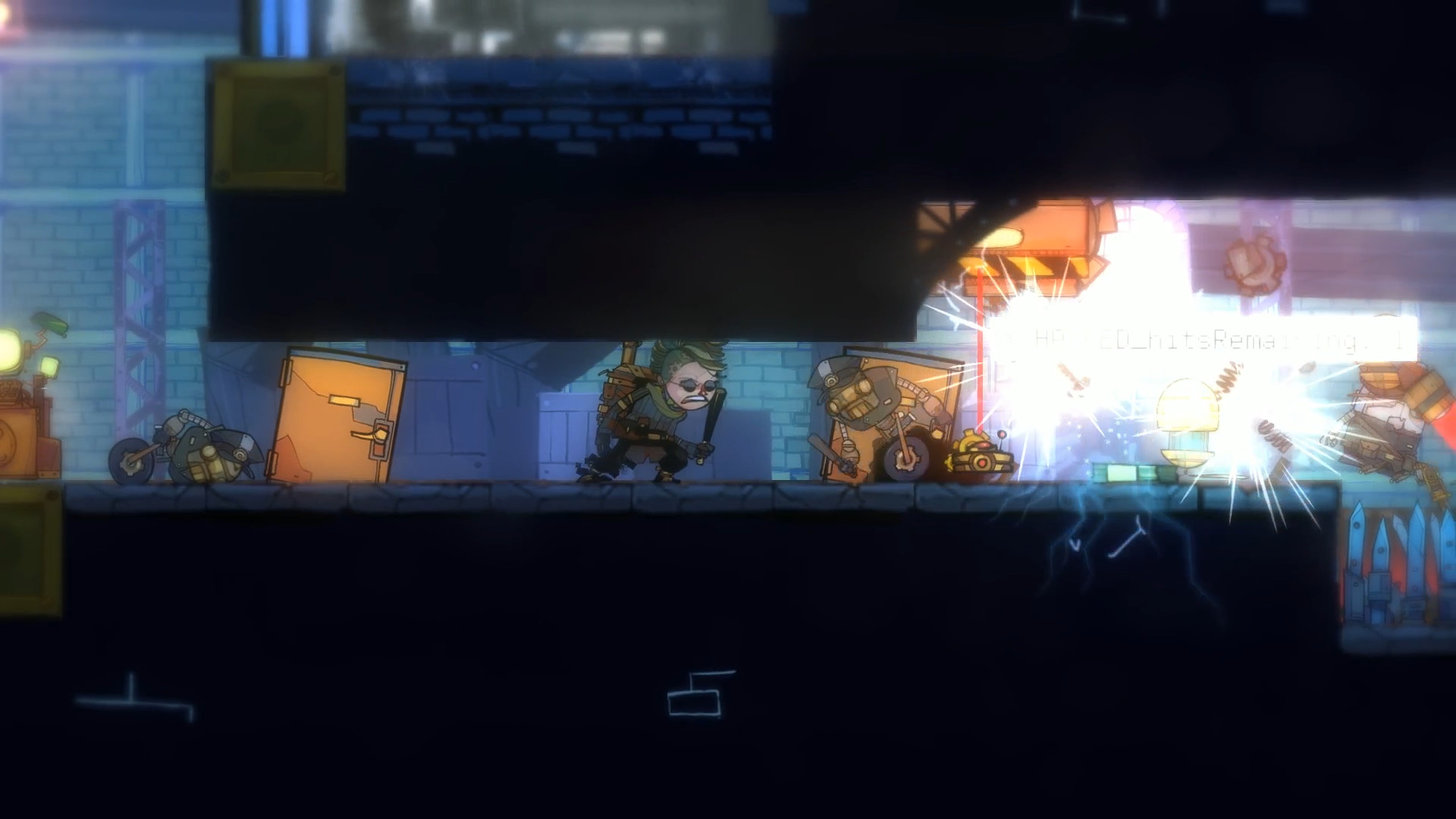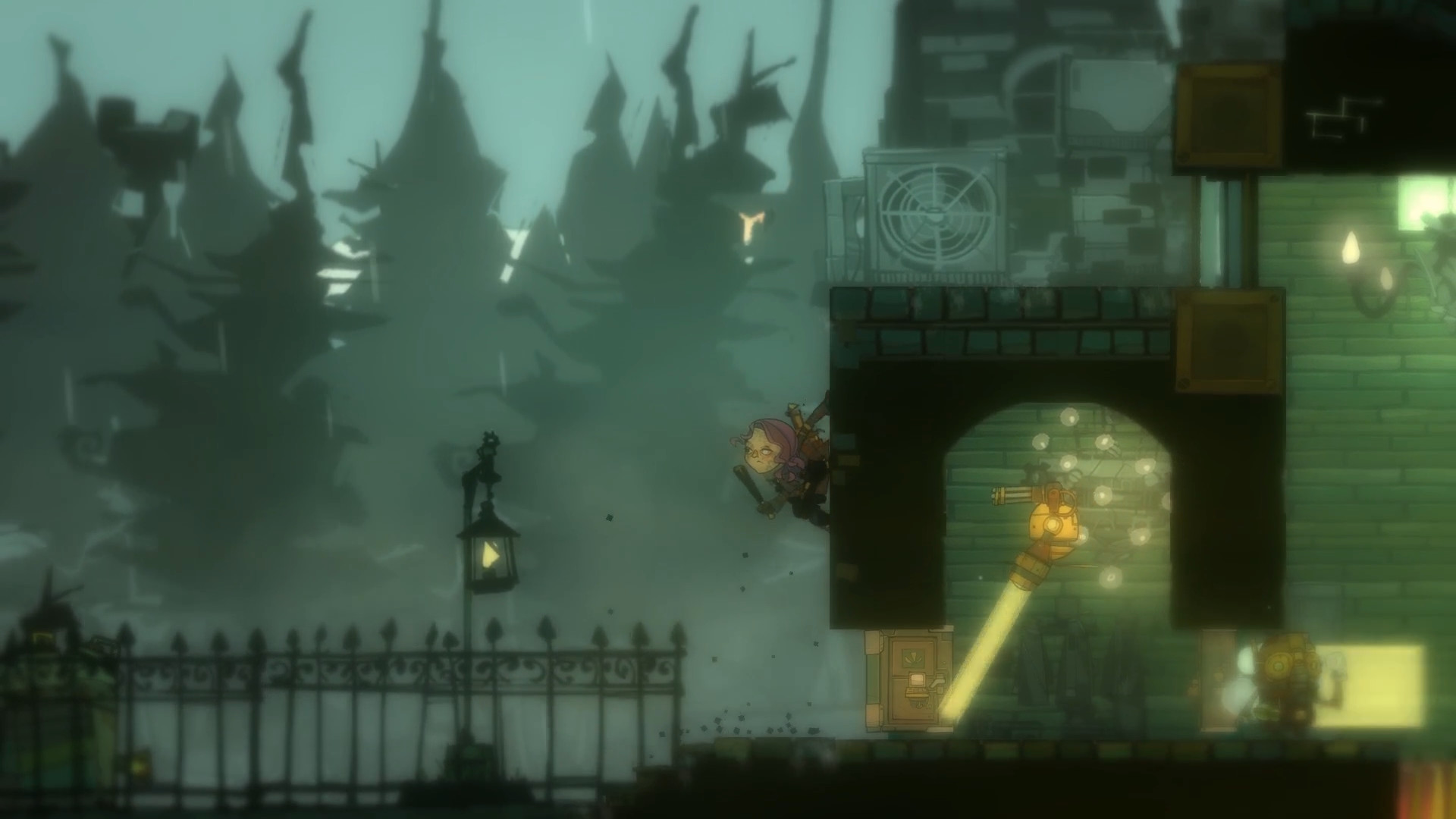The F.B.I and cartoon character Dick Tracy, originators of the idiom “crime doesn’t pay,” were clearly idiots not familiar with modern video games. Given they came up with it in 1927 and were fictional respectively, that’s perhaps understandable; but between Grand Theft Auto, Payday, Ace Attorney (Don’t pretend that Phoenix Wright hasn’t been in contempt of court about a quintillion times), and now The Swindle, it’s clear that video game designers disagree with the old adage – and as GTAV approaches 100 million copies sold, I’m sure Rockstar Games would argue crime pays very well indeed. But what about The Swindle, newly arrived “Steampunk Cybercrime Caper” on the Switch – does it offer pilfering, purloining perfection, or is it a pain in the larceny?

An itch to Snatch
The Swindle focuses on an alternative timeline, cyberpunk dystopia-past London (and it is always London, which for some reason attracts cyberpunk enthusiasts like a picnic attracts bears), where poverty is rife and a callous, disinterested ruling party has bred rampant crime – so basically present-day London with some cogs glued to it. But Scotland Yard is about to gain the upper hand – having developed an Artificial Intelligence surveillance system that can allegedly see everything (so basically a robo-Santa) and named it’s “The Devil’s Basilisk,” which even the most emo of metal bands would cringe a little at. Because they’re good sports, Scotland Yard isn’t going to turn on Lucifer’s Lizard for 100 days, giving the player character a chance to filch it and run – because apparently, a highly advanced AI system in the 1840’s is small enough that you can just stick it up your jumper, and also because evidently nobody thought to make a copy. Backup your files people!

Stainless Steal
What’s nice about The Swindle is that is doesn’t overcomplicate things; there’s no obfuscating sideplots, no smarmy protagonist banter or irritating collectibles – it’s all about the money (-Jessie J, 2011) and all about pilfering that Basilisk: a day countdown ominously hovers on every loading screen, and all the proceeds of heists are spent on furthering your fledgeling fugitive future – gaining the ability to hack computer terminals, improve your security clearance to stage bigger heists, and even things like double-jumping, which I wish was a purchase available to the general public. The actual gameplay takes place on a 2D plane; sneaking past automated cop-bots, snatching as much cash as your grubby little mitts can hold and, if you’re lucky, actually making it back alive. It’s a game with the fat cut out, which gives proceedings a nice sense of focus and drive.

Another strong selling point is the atmosphere The Swindle conjures – everything is tweaked just so to create mood perfectly – both when on the prowl and on the run. The graphics have a pencil-sketch feel to them – especially the player character, who tends to look like a picasso exposed to a flame – which gives them a rough feel and immediately casts them as the sort of misfit plunderer they are.The colour palette consists of murky, smoggy, earthy tones, making heists dark and moody, and the music has light piano flairs and a consistent “tick-tock” backbeat, invoking typical heist-movie soundtracks while also serving as a reminder that your days are, literally, numbered. Then, if (or perhaps more likely when) your defective defalcator gets detected, everything flips on its head; the colours immediately go more red and urgent, and the soundtrack goes completely bonkers, swapping to a fast-paced techno track, which couldn’t sound more like “danger” unless it swapped the instruments for picnic-deprived bears. It gives the experience an interesting dichotomy between it’s two “moods,” and the balance between the two keeps things feeling fresher.

Sneak-qual and Opposite
Sadly for The Swindle, Newton’s Third Law of Journalism is in effect here; for every nice thing I have to say about it, there is an equal and opposite bad thing waiting around the corner. For all the benefits of the streamlined upgrade system, it does also have some fairly fatal flaws; chief among which is having to buy access to additional levels, which leaves you the awkward, un-fun decision of either playing the same level over and over again (the game does randomly generate its levels, but not to a huge degree), or being greatly underskilled and underpowered for the later levels. Additionally, abilities that feel like they should be inherent, like an immunity to fall damage and the aforementioned double jump, are locked behind upgrades, forcing more money to be spent on these rather than any real progression – and moreover, the game lacks any real tutorial, so the first time you die of fall damage it will be a surprise and you will feel completely cheated.

The game is also completely sadistic about its difficulty. Triggering the guards and summoning the rozzers for getting spotted once I’m on board with; dying in one hit is a different story. Especially when that death is to a spike pit spawned in an awkward position by the procedural generator, and compounded by how ungainly and unnatural the player character’s jump is – controlling the thief anywhere except on the ground is like piloting a hot air balloon full of furious gibbons. Or especially when that death is caused by a new enemy type you haven’t seen before because again, the game has no tutorial of any kind. Especially when the game’s moody darkness can obscure obstacles and get you killed by things you couldn’t even see, and ESPECIALLY when a death, as easily as they come, leaves you with absolutely no money at all, so your punishment for dying is having to play the same levels over and over again, with no real ability to improve. It’s probably meant to feel punishing but it’s too infuriating for its own good; instead of encouraging players to pick themselves up, dust themselves down and try again, it encourages them to pick themselves up, put their switch down, and play something else.
A Sonic-the-Hedgehog-esque money-as-health system would be my proposed solution, where every hit results in some dropped wonga as you limp back to the escape vessel, but until then, for all The Swindle’s good attributes, it manages to suck the fun out of its own good ideas so thoroughly in its early-game that many players won’t have the desire to soldier on.








You must be logged in to post a comment.